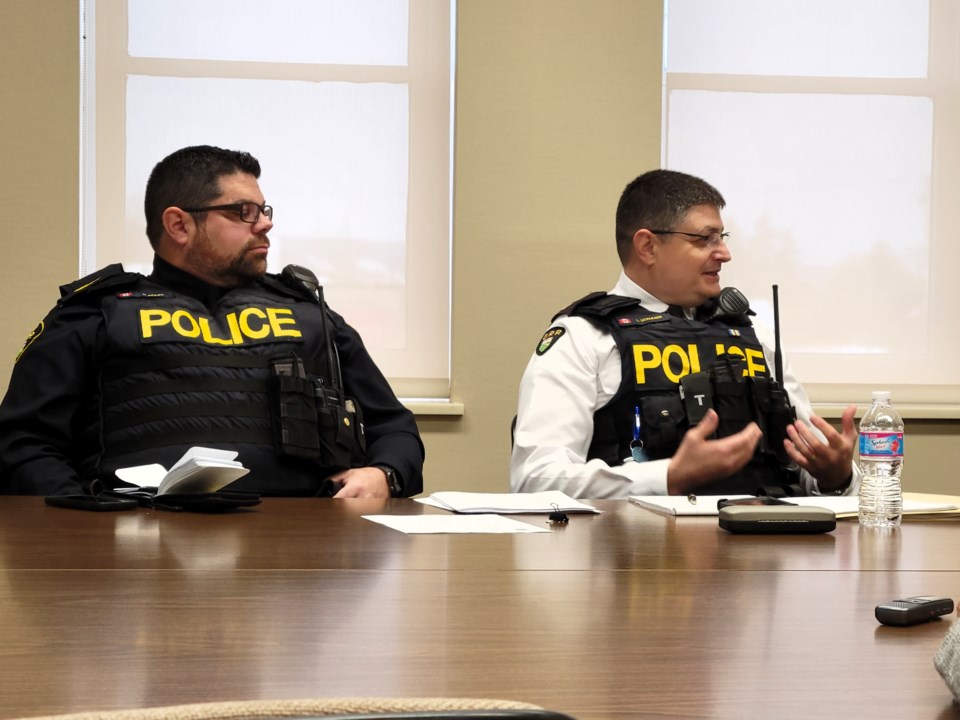A major overhaul to policing rules in Ontario will take effect next week, and the Collingwood and Blue Mountain OPP’s detachment commander and police service board chair welcome the changes.
The new Community Safety and Policing Act (CSPA) comes into effect on April 1. First passed by the provincial government in 2019, once in force, the CSPA will replace the current Police Services Act.
Some key changes set to take effect next week include a new public complaints process, the addition of a new role of the Inspector General of Policing, codes of conduct for officers, special constables and police services board members.
“I think we’re headed in the right direction and a good direction,” said Collingwood’s detachment commander Insp. Loris Licharson in an interview with CollingwoodToday. “It was high time the Police Services Act was reviewed and enhanced.”
“It’s establishing accountability and oversight for policing in Ontario that will set us up for future success for the years to come. I think it’s a good thing,” he said.
New rules under the act give power to police chiefs to suspend officers without pay under certain circumstances. Under the previous act, officers in Ontario were only suspended without pay if they were both convicted of an offence and given prison time as a sentence.
“The Police Services Act came in in 1990, and there’s been a lot of change in society, but also in policing itself,” said Licharson. “There’s a huge change in technology, case law and changing understanding of socioeconomic factors that impact what we deal with, and the complexity of the calls we deal with.”
“We’re doing things better, but I think there’s also a demand for accountability and governance from the general population when it comes to the policing services they get,” he said.
While Licharson said most residents won’t see changes to how the Collingwood and Blue Mountains OPP operates through the new act, many of the changes will involve internal structures. He said the new act establishes standards that may impact the operations of smaller police forces.
“The good thing is, we already have a lot of that (already) due to being a provincial force,” said Licharson.
Codes of conduct for police officers are being amended, with Licharson pointing to examples such as a new section specifically about neglecting the health and safety of a person in custody.
“Before, it would have been included in the all-encompassing neglect-of-duty section. It really boils down to modernization of language and different categories of offences,” he said.
The Inspector General of Policing will be appointed by the Lieutenant Governor for five-year terms, and will be responsible to monitor and conduct inspections of police services and boards in Ontario to make sure they comply with the act and investigate misconduct. They will have the power to require a police service to be overseen by another entity and to remove officers from leadership positions if necessary.
“They’ll take a proactive role on the application of this act across the province,” Licharson explained. “I think we’ll see more consistency across the province with all police services.”
The Law Enforcement Complaints Agency (LECA) will become the new authority to address public complaints about the conduct of police officers and will have the power to investigate even if a complaint hasn’t been formally made.
Codes of conduct, which had previously only covered the conduct of police officers, will now extend to special constables and police services board members as well.
Other major changes to police services boards province-wide will see members get a new expanded training through the act, which is still to be rolled out. Those boards will need to prepare and adopt a communications plan, a business plan and a diversity plan to ensure that members of the police service reflect the diversity of the area.
Collingwood police services board chair Claire Tucker-Reid said the intention of the act is to make sure police services boards are more engaged with their communities and reflect community ideas.
“We’ll use that information to set policy and action plans,” she explained. “They want us to stand out more as entities...and be more visible to better understand community priorities.”
So far, Tucker-Reid said the Collingwood police service board priorities to date have included more youth engagement, evidence-based decision making and fraud targeting seniors.
“They will continue to be a priority in Collingwood,” she said.
Moving forward, the Collingwood OPP with the Collingwood police services board have put together a transition team who will be launching public engagement including a survey in the coming months to help shape their new communications and business plans, with a goal of having them implemented by 2025.
They’ll be establishing a formal way for residents to communicate regarding the plans in the coming months, but in the meantime, community suggestions can be emailed to town deputy clerk Becky Dahl at [email protected] for consideration by the board.



